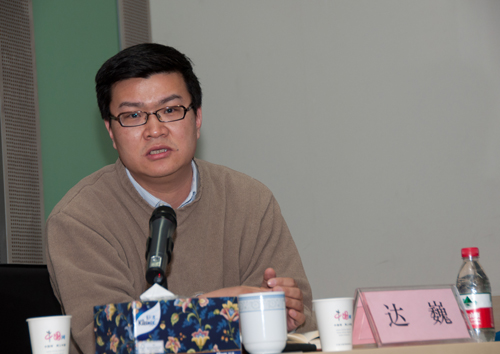US 'Pivot' in Asia-Pacific signals new, complex era
- By Lin Liyao
 0 Comment(s)
0 Comment(s) Print
Print E-mail China.org.cn, February 26, 2012
E-mail China.org.cn, February 26, 2012
Da Wei, a scholar from the China Institute of Contemporary International Relations, gave a speech on Feb. 23 in which he discussed U.S. President Barack Obama's "pivot" in relation to America's Asia-Pacific strategy. The speech was delivered at a seminar organized by China.org.cn to mark the 40th anniversary of Sino-U.S. relations. Six scholars participated in the seminar, sharing their views on bilateral relations between the two countries.
|
|
|
Da Wei, a scholar from the China Institute of Contemporary International Relations,?are giving?a speech at a seminar organized by China.org.cn to mark the 40th anniversary of Sino-U.S. relations on Feb. 23. [Photo by Chen Boyuan/China.org.cn] |
In this context, "Pivot" derives from a basketball tactic in which one foot remains fixed in place, allowing a player to change direction without moving the pivot foot in order to either pass or make a shot. The word is currently being used to describe America's strategy with regard to the Asia-Pacific region and it signifies the strategic importance of the region in terms of America's global strategy.
But is it a strategy predicated on containing China's rise within the region? Da Wei prefers "rebalance" to "containment", and in that sense he differs from other perspectives circulating in both the Chinese media and Chinese public opinion generally.
He explained that containment is used to describe a country's counter-expansion, much in the same way that a cup contains water. This is not, in fact, true of Sino-U.S. relations.
"When pondering this question, you need to consider the kinds of resources the U.S. is employing with regard to achieving its aims through this strategy," he said. "My conclusion was that, after I made a general comparison between political, economic and military investment, the U.S. is principally focusing on political investment in the Asia-Pacific region.
"Its 'return to Asia-Pacific' strategy can be viewed as a more overt expression of President Obama's smart power or smart diplomacy. By pursing this strategy, the U.S. has the opportunity to forge closer links with Asian countries and extend its influence in the Asia-Pacific region, including Southeast Asia, Northeast Asia, South Asia and Pacific countries. With regard to China, the main objective of the U.S. is to contain China and ensure that no move China makes in the region goes unchecked."
He thinks that currently the main issue facing China is the widely-held belief among the public that the U.S. "return" strategy is simply Cold War-style containment. Senior U.S. governors have, through increased communication with Chinese leaders, attempted to explain that their strategy is not specifically an anti-Chinese measure. However, both Chinese scholars and members of the public find that explanation difficult to understand in light of current events.
Discussing the future, Da Wei commented that as the Asia-Pacific region continues to grow in importance and China's influence further expands, Sino-U.S. relations will become more complex. "The current competition in the region between the two countries is predicated on which side is smarter than the other," he said.
"With the U.S. engaged in its 'smart diplomacy', China also has to become 'smarter'. We should formulate a strategic vision and act with political wisdom in order to seek points of agreement while reserving the right to hold our differences. We should also ensure that public opinion remains positive and engaged and coordinate domestic diplomatic actors and different departments. Additionally, we must try to transcend the limitations of domestic interest groups and avoid the excessively interference of various ideologies."






